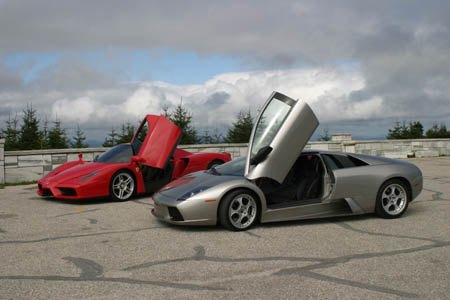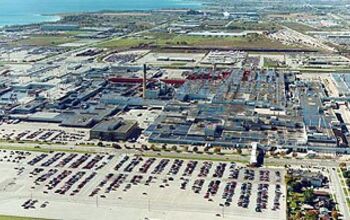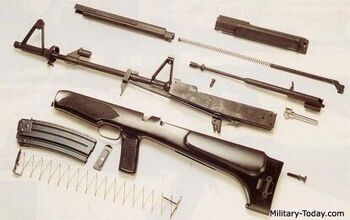Killing the Golden Goose
Chasing Robert Berry's Enzo up Equinox Mountain in a Lamborghini Murcielago, I remember thinking there's no way I'm going to keep up with this guy. As the Ferrari's exhaust note ripped through the Murcie's windscreen like a shotgun blast through fiberboard, I set my priorities: no dying, no crashing, no humiliation. The big bull proved equal to the task. Every time I over-cooked it, the Murcie's front tires juddered and… we're back! Every time Berry slowed for a turn, the V12 supercar closed the gap. The experience gave me a profound respect for Lamborghini. And then I drove a Gallardo.
As reported here, the Gallardo is as cohesive as a first grader's art collage. While the four-wheel drive supercar cuts corners like a bankrupt builder, the Gallardo's over-wrought sheetmetal, humdrum cabin, relatively feeble brakes, lack of low-end grunt, questionable high-speed stability and point and clunk paddle shift gearbox wouldn't pass muster in an entry level Porsche or, for that matter, a garden variety Audi. Well exactly. Audi has owned Lamborghini since 1988. The Gallardo (né '03) should have married German precision and Italian passion. Instead, it joined German flair with Italian fastidiousness.
Given the parade of eccentrics who've owned Lamborghini since the Arab oil embargo first forced the former tractor maker into receivership– Georges-Henri Rossetti and René Leimer (Swiss investors), the Mimran brothers (Senegalese-born French food tycoons), The Chrysler Corporation (recovered US bankrupt), 'Tommy' Suharto (son of the former president of Indonesia, now serving 15 years for murder) — Audi deserves credit for saving Lamborghini from oblivion. But at what cost? Lamborghini's build quality may now, finally, match that of an average Ford, but the company's entry level model fails to embody the marque's well-established brand values. It's a sure sign that the venerable nameplate is, once again, heading for disaster.
Let's be clear about this. Automotive identities are not half as mystical as the fees brand consultants charge to divine them. In fact, if you can't sum-up a car company's core values in four words, the chances are it doesn't have any. By the same token, any marque that sells models that don't embody those values is in deep shit– whether they know it or not. Jaguar: sexy looks, smooth ride. BMW: impeccable ergonomics, superb handling. Toyota: faultless build, cheap price. Cadillac: ummmm. Mercury: errrr. Lamborghini: sexy body, monstrous power. Almost every Lambo ever produced conforms to this recipe (even the mid-engined Miura). The Gallardo does not.
Lamborghini's failure to stick to the knitting highlights an insidious force that destroys valued brands: cash. With a few exceptions (e.g. Saturn), automotive manufacturers start as bootstrap operations. The lack of resources forces them to be focused, creative, dynamic and driven. As venture capitalists and dot bombers have discovered, the more money you plough into a small company, the less efficient it becomes. When Lambo's budgets were tight, managers had to sweat every investment, every sale, everything, all the time. When investors like Audi backed the Brinks truck up to the company gate, suddenly, anything was possible. Paint bubbling? Panel gaps visible from outer space? Sorted. Hey, I know! How about we get a Belgian to design a small Lamborghini and give it a torque-deficient V10 engine? Increasing possibilities increases the possibility of mistakes– and doubles the difficulty of rectification.
Just because you CAN do something doesn't mean you SHOULD. Unless management protects a car company's core values, focus is lost. From there, short term gain's siren song seduces the company into building brand-betraying products. There are plenty of examples: Lincoln Zephyr, Buick Terraza, Saab 9-7x, Jaguar X-Type and more. Cash-rich companies fool themselves into thinking they have to do everything– reliability, safety, performance, style, comfort, packaging, fuel efficiency, etc.– and do everything well. Their survival actually depends on creating cars that do one or (at the most) two things better than anyone else.
It's all part of the automotive equivalent of the Big Bang. In the early 1900's, hundreds of tightly-focused car companies exploded onto the scene. The consolidations that gave birth to GM and the rest of today's limited universe of multi-branded automotive conglomerates continued until the century's close. Now, the entire system is collapsing in on itself, leaving a handful of major players. Eventually it will implode, leading to another explosion of small manufacturers (aided by globalization and new technology).
In that sense, the brand-busting Gallardo is a sign of the times. Whether or not Lamborghini ultimately withstands Audi's stewardship is an open question. But energy is never lost. As long as there are wealthy drivers who crave the howl of a big-bore V12 encased inside an in-yer-face Italianate wrapper, Lamborghini has a future. As for all the other emotive car brands currently sheltering under the wing of a multinational conglomerate, well, the road to Hell really is paved with good intentions.
More by Robert Farago
Latest Car Reviews
Read moreLatest Product Reviews
Read moreRecent Comments
- TheEndlessEnigma Of course they should unionize. US based automotive production component production and auto assembly plants with unionized memberships produce the highest quality products in the automotive sector. Just look at the high quality products produced by GM, Ford and Chrysler!
- Redapple2 Got cha. No big.
- Theflyersfan The wheel and tire combo is tragic and the "M Stripe" has to go, but overall, this one is a keeper. Provided the mileage isn't 300,000 and the service records don't read like a horror novel, this could be one of the last (almost) unmodified E34s out there that isn't rotting in a barn. I can see this ad being taken down quickly due to someone taking the chance. Recently had some good finds here. Which means Monday, we'll see a 1999 Honda Civic with falling off body mods from Pep Boys, a rusted fart can, Honda Rot with bad paint, 400,000 miles, and a biohazard interior, all for the unrealistic price of $10,000.
- Theflyersfan Expect a press report about an expansion of VW's Mexican plant any day now. I'm all for worker's rights to get the best (and fair) wages and benefits possible, but didn't VW, and for that matter many of the Asian and European carmaker plants in the south, already have as good of, if not better wages already? This can drive a wedge in those plants and this might be a case of be careful what you wish for.
- Jkross22 When I think about products that I buy that are of the highest quality or are of great value, I have no idea if they are made as a whole or in parts by unionized employees. As a customer, that's really all I care about. When I think about services I receive from unionized and non-unionized employees, it varies from C- to F levels of service. Will unionizing make the cars better or worse?


































Comments
Join the conversation